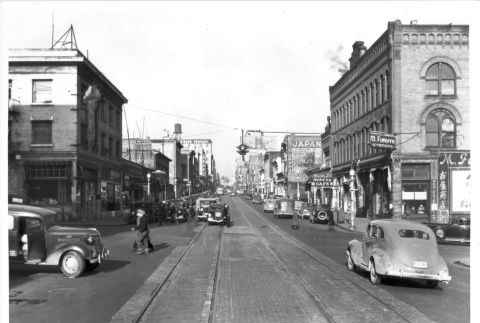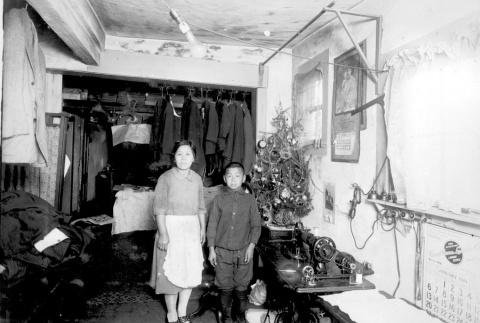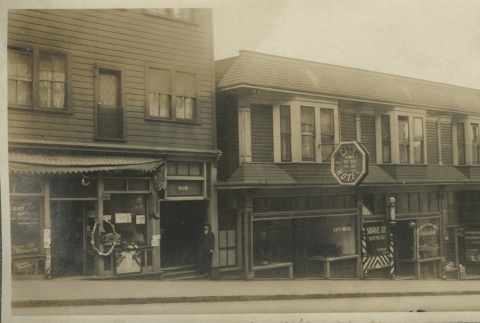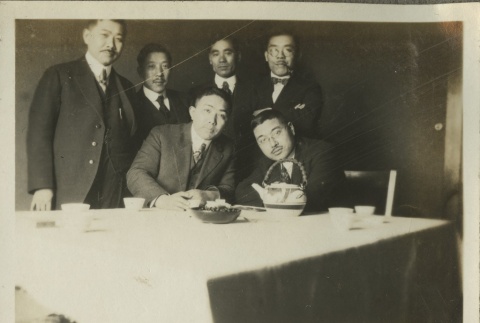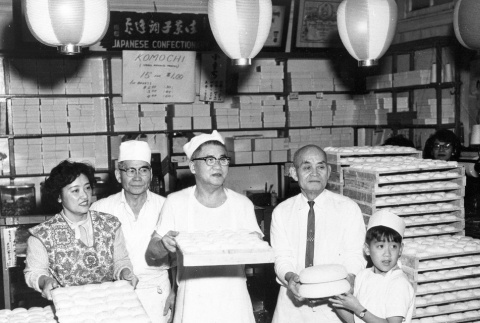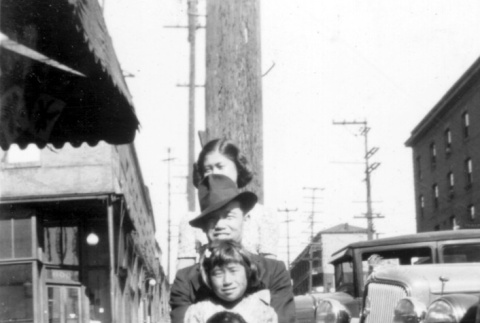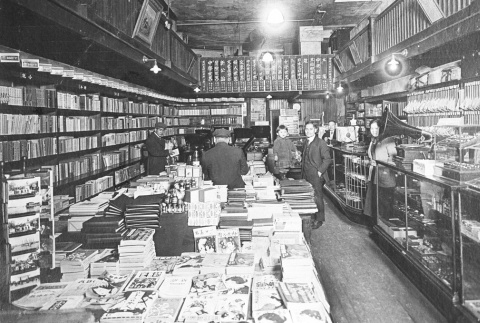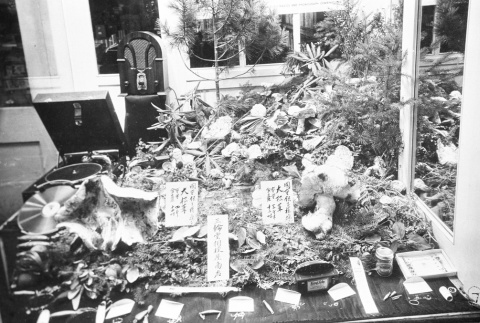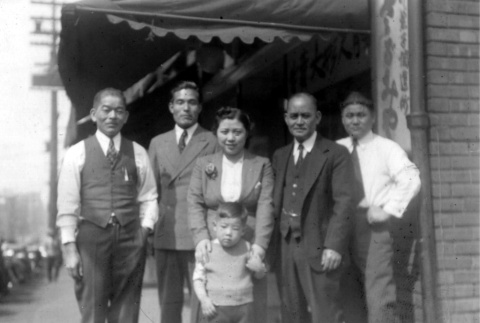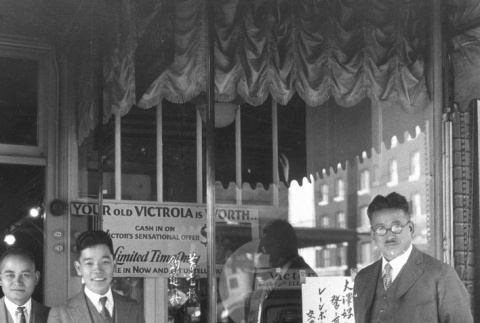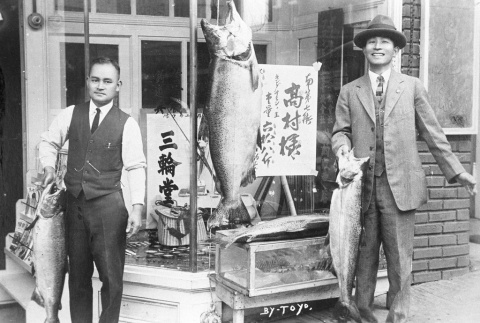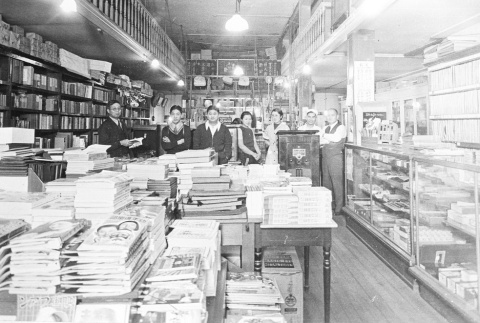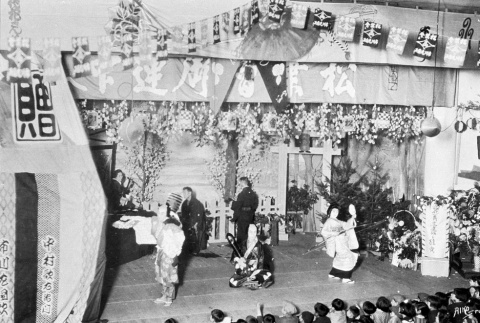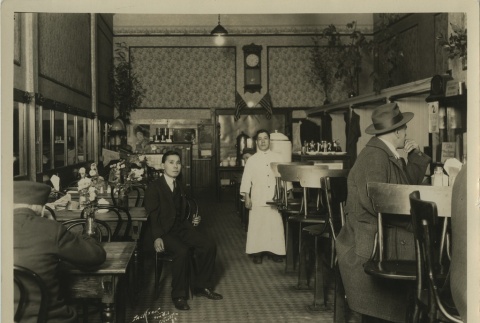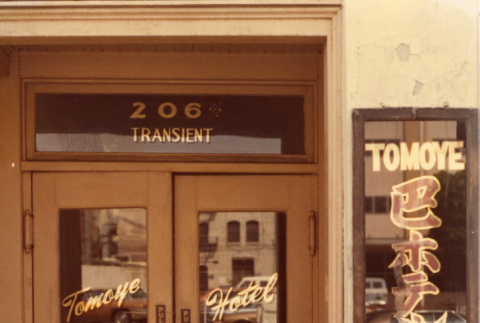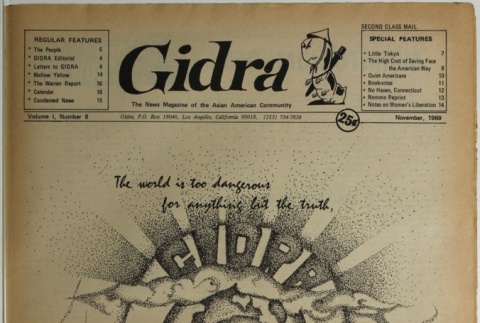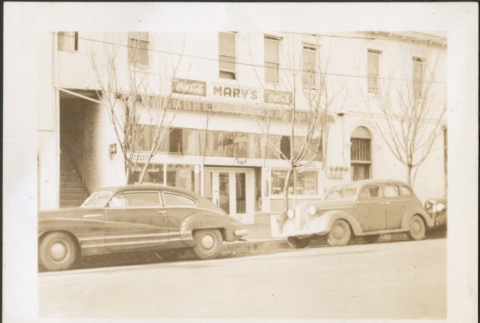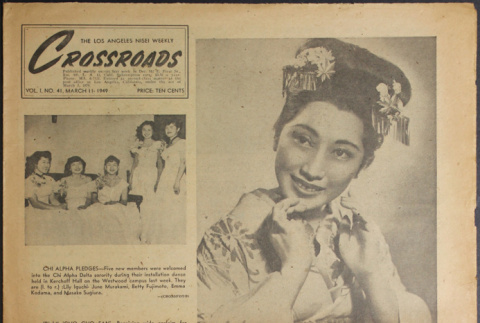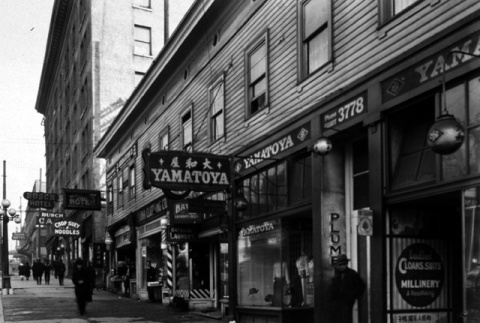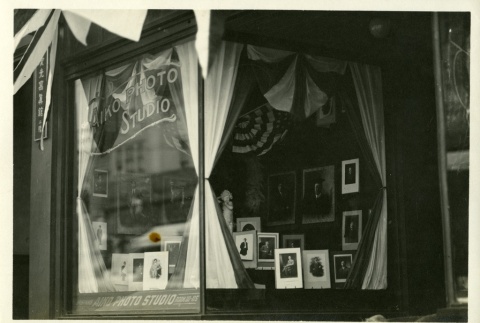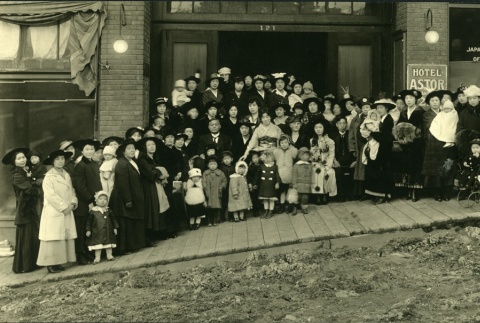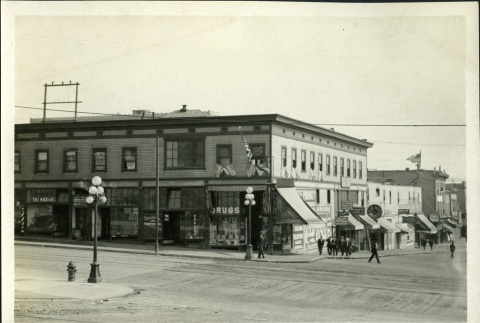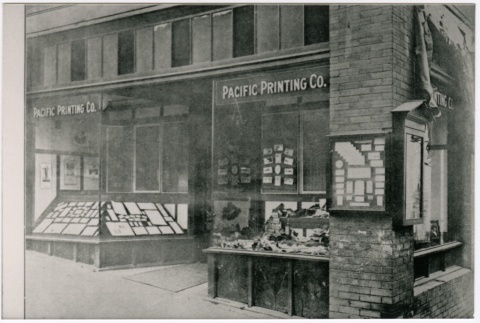Nihonmachi ("Japantowns")
Because of housing and employment discrimination, Japanese Americans tended to cluster in ethnic neighborhoods known as Nihonmachi, or "Japantowns." Living, working, studying, and worshiping in close proximity made for tight-knit communities. With the forced removal of Japanese Americans in the spring of 1942, the bustling Nihonmachis of the West Coast closed down and never fully recovered, even after the war ended.
Community activities
(871)
Nihonmachi ("Japantowns")
(205)
205 items
205 items
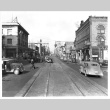
img
Nihonmachi, or Japantown (ddr-densho-109-86)
Center of Tacoma, Washington's Japantown at Thirteenth and Broadway.
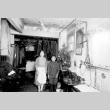
img
Yokohama Tailor and Laundry (ddr-densho-12-10)
Fusa Kunitsugu (left) and her son, Teruo, inside the Yokohama Tailor and Laundry, located at 515 Yesler Way in Seattle's Nihonmachi, or Japantown.
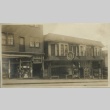
img
Nihonmachi hotel (ddr-densho-124-16)
An Issei man stands in the doorway of his hotel, located on Yesler Avenue in Seattle's Nihonmachi or Japantown.
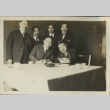
img
Dinner party (ddr-densho-124-27)
These Issei are eating dinner at Maneki Restaurant in Seattle's Nihonmachi or Japantown. (L to R): Azuma (or Higashi), Eiji, unidentified, Tamura, unidentified, Azuma (or Higashi), Yoshizo (or Ryozo), Yamaguchi, Tadashi.
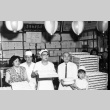
img
Sagamiya confectionery (ddr-densho-13-1)
The Sagamiya confectionery was located at 524 Main Street in the area previously known as Nihonmachi, now Seattle's International District. Sagamiya closed in the early 1970s. Left to right: Yoshi Mamiya, Shuzo Asaba, Nobujiro Shibata, Kinzo Asaba, and Rick Mamiya.
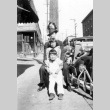
img
Family and friends in Nihonmachi (ddr-densho-13-38)
Top to bottom: Yayeko Asaba, unidentified, Kimiko Asaba, and Yeichi Asaba in front of Sagamiya, a Japanese confectionery, located at 524 Main Street in Seattle's Nihonmachi.
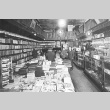
img
Interior of Mitsuwado store (ddr-densho-13-32)
The Mitsuwado store, located at 522 Main Street, was owned by Kinzo Asaba (right). The store sold a variety of items including books, records, record players, and fishing tackle. Asaba's daughter, Chiyo, stands next to him.
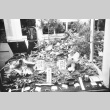
img
Mitsuwado store's window display (ddr-densho-13-34)
The Mitsuwado store was located at 522 Main Street in Seattle's Nihonmachi, or Japantown. In this display are matsutake (pine mushrooms) and various prizes to be awarded to fishing derby winners.
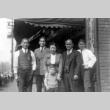
img
Family in front of their store (ddr-densho-13-39)
Left to right: Mr. Kawai, unidentified, Haruye (last name unknown) holding Teruo Shibata, Kinzo Asaba, and Nobujiro Shibata in front of Sagamiya, a Japanese confectionery, which was located at 524 Main in Seattle's Nihonmachi, or Japantown. Sagamiya was an institution in Seattle's Nihonmachi, well known for its mochigashi (Japanese rice cakes). Founded in the early 1900s …
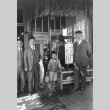
img
Three Issei men and child outside the Mitsuwado store (ddr-densho-13-2)
Mitsuwado was located at 522 Main Street in Seattle's Nihonmachi, or Japantown. The store sold a variety of items including books, records, record players, and fishing tackle. Left to right: Kinzo Asaba (the store's owner), Mr. Osawa, unidentified, and unidentified.
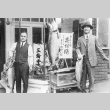
img
Two Issei men outside the Mitsuwado store (ddr-densho-13-16)
The Mitsuwado store was located at 522 Main Street in Seattle's Nihonmachi, or Japantown. The store sold a variety of items including books, records, record players, and fishing tackle. The store's owner, Kinzo Asaba, is on the left.
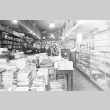
img
Mitsuwado store (ddr-densho-13-31)
The Mitsuwado store, located at 522 Main Street, was owned by Kinzo Asaba. The store sold a variety of items including books, records, record players, and fishing tackle. Left to right: Mr. Izui, Denny Yoshimura, Nobujiro Shibata, Ayako Shibata, Yoshiko Hagiya, Shuzo Asaba, and Kinzo Asaba.
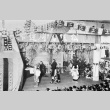
img
Classical dance performance (ddr-densho-13-15)
This dance performance took place at the Nippon Kan Theatre in Seattle's Nihonmachi (Japantown) area.
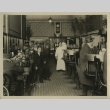
img
Nihonmachi restaurant (ddr-densho-140-2)
Genji Mihara talks with the waiter at an Issei-operated cafe in Seattle's Nihonmachi or Japantown. (L to R): Genji Mihara, Sakae Ojima, unidentified.

vh
An Oral History with Katsuma Mukaeda (ddr-csujad-29-56)
Chairman of Japanese American Cultural Center and former president of Japanese Chamber of Commerce recounts conditions of prewar Los Angeles's Little Tokyo, its wartime conversion into a black community, postwar reestablishment as a Japanese-American cultural and commercial center. Includes comments on discriminatory legislation, prewar Japan-American relations. World War II removal and incarceration, camp conditions, wartime repatriation …
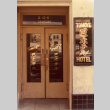
img
Tomoye Hotel (ddr-csujad-29-241)
Photograph of the front of the Tomoye Hotel. See this object in the California State Universities Japanese American Digitization project site: P184

vh
An oral history with Katsumi Kunitsugu (ddr-csujad-29-66)
An oral interview with Katsumi Kunitsugu, longtime volunteer and leader in Little Tokyo. The interview was conducted for the Japanese American Oral History Project by California State University, Fullerton. Transcript is found in item: csufccop_jaoh_0164. See this object in the California State Universities Japanese American Digitization project site: 3378_T01
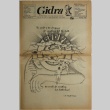
doc
Gidra, Vol. I, No. 8 (November 1969) (ddr-densho-297-8)
Selected article titles: "Moratorium Day" (p. 2), "1969 Internal Security Act" (p. 2), "Pioneer Center Opens in Little Tokyo" (p. 3), "Yellow and Proud" (p. 5), "Revelance of Ethnic Studies" (p. 5), "The High Cost of Saving Face the American Way" (p. 8-9).
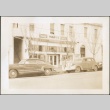
img
Street view of 'Mary's' store (ddr-densho-298-179)
Caption in album: "Once popular hangout in Sacto's 'Tiny Tokyo.'"
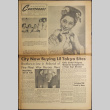
doc
Crossroads, Vol. 1, No. 41 (March 11, 1949) (ddr-densho-358-15)
Selected article titles: "City Now Buying Lil Tokyo Sites" (p.1), "Brothers-in-Law in Reburial of Five Nisei War Heroes Here" (p.1), "More Strandee Cases Set for Trial, May 17" (p.2), "Scientist Decries Lack of Equipment to Carry on Research in Cancer" (p.3).
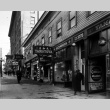
img
Nihonmachi (Japantown) (ddr-densho-36-47)
South Jackson Street in Seattle's Nihonmachi, or Japantown. The museum's original identifying information dated this photo to circa 1910. Densho's later date, circa 1920s, is based on the clothing shown in the photograph.
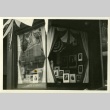
img
Aiko photo studio (ddr-densho-35-296)
Aiko photo studio was located on Sixth and Jackson in Seattle's Nihonmachi or Japantown.
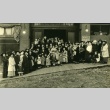
img
Issei women at the Astor Hotel (ddr-densho-35-298)
These women and children are standing outside of the historic Astor Hotel, which housed the Nippon Kan Theatre.
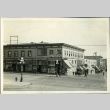
img
Aiko photo studio (ddr-densho-35-295)
Aiko photo studio was located on the second floor of this building on Sixth and Jackson in Seattle.
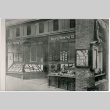
img
Jiro Kaneko's Pacific Printing Company (ddr-densho-353-87)
The Pacific Printing Company was located at 611 Main Street.
